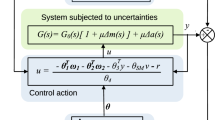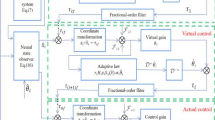Abstract
The existing estimators for discrete-time Lipschitz switched systems have several main weaknesses, including the inability to estimate time-varying faults, the conservative structure of the switching pattern, and the inability to reduce the effect of disturbances on the estimation error using a non-weighted criterion. To address these weaknesses, a robust discrete-time estimator with a persistent dwell-time structure is proposed based on dissipative theory. In this new scheme, the fault’s time-varying dynamics are defined and incorporated into the state space equations. By developing the estimator using the augmented state space and dissipative property conditions, it becomes capable of estimating time-varying faults and mitigating the impact of disturbances on the estimation error. Overcoming the challenge of converting the dissipative property conditions into a feasibility problem in a linear matrix inequality context is a noteworthy achievement of this research. On the other hand, the adoption of the persistent dwell-time structure, as opposed to the average dwell-time structure, enables the assurance of stability across a broader range of switching patterns. Furthermore, it establishes a non-weighted criterion to attenuate disturbances, imbuing the process of disturbance attenuation with tangible physical meaning. Consequently, this estimator becomes compatible with a broader range of keying systems. To evaluate the proposed design, a simulation of a chemical plant is conducted. The results obtained from the simulation validate the effectiveness of the suggested design.










Similar content being viewed by others
Data availability
The authors do not have permissions to share data.
References
Benallouch M, Schutz G, Fiorelli D, Boutayeb M (2014) H∞ model predictive control for discrete-time switched linear systems with application to drinking water supply network. J Process Control 24(6):924–938
Chen L, Fu S, Zhao Y, Liu M, Qiu J (2019a) State and fault observer design for switched systems via an adaptive fuzzy approach. IEEE Trans Fuzzy Syst 28(9):2107–2118
Chen H, Du D, Zhu D, Yang Y (2019b) UIO-based fault estimation and accommodation for nonlinear switched systems. Int J Control Autom Syst 17:435–444
Cheng P, Wang H, Stojanovic V, He S, Shi K, Luan X, Sun C (2021a) Asynchronous fault detection observer for 2-D Markov jump systems. IEEE Trans Cybern 52(12):13623–13634
Cheng P, Chen M, Stojanovic V, He S (2021b) Asynchronous fault detection filtering for piecewise homogenous Markov jump linear systems via a dual hidden Markov model. Mech Syst Signal Process 151:107353
Cheng P, He S, Zhang W (2023) A genetic algorithm-assisted fault detection observer for networked systems under denial-of-service attacks. IEEE Trans Reliab. https://doi.org/10.1109/TR.2023.3311400
Du D, Cocquempot V, Jiang B (2019) Robust fault estimation observer design for switched systems with unknown input. Appl Math Comput 348:70–83
Lei Q, Wang R, Jie B (2018) Fault diagnosis based on dissipativity property. Comput Chem Eng 108:360–371
Li Y, Tong S (2017) Adaptive neural networks prescribed performance control design for switched interconnected uncertain nonlinear systems. IEEE Trans Neural Netw Learn Syst 29(7):3059–3068
Li L, Jia Y, Du J, Yuan S (2008) Robust L2–L∞ control for uncertain singular systems with time-varying delay. Prog Nat Sci 18(8):1015–1021
Li Y, Sui S, Tong S (2016) Adaptive fuzzy control design for stochastic nonlinear switched systems with arbitrary switchings and unmodeled dynamics. IEEE Trans Cybern 47(2):403–414
Li Y, Tong S, Liu L, Feng G (2017) Adaptive output-feedback control design with prescribed performance for switched nonlinear systems. Automatica 80:225–231
Li J, Pan K, Zhang D, Su Q (2019) Robust fault detection and estimation observer design for switched systems. Nonlinear Anal Hybrid Syst 34:30–42
Liu Q, Zhao J (2020) Switched adaptive observers design for a class of switched uncertain nonlinear systems. Nonlinear Anal Hybrid Syst 36:100866
Long L, Zhao J (2014) Adaptive output-feedback neural control of switched uncertain nonlinear systems with average dwell time. IEEE Trans Neural Netw Learn Syst 26(7):1350–1362
Niu B, Karimi HR, Wang H, Liu Y (2016) Adaptive output-feedback controller design for switched nonlinear stochastic systems with a modified average dwell-time method. IEEE Trans Syst Man Cybern Syst 47(7):1371–1382
Nodozi I, Rahmani M (2017) LMI-based model predictive control for switched nonlinear systems. J Process Control 59:49–58
Qi Y, Yu W, Huang J, Yu Y (2021) Model predictive control for switched systems with a novel mixed time/event-triggering mechanism. Nonlinear Anal Hybrid Syst 42:101081
Shi S, Shi Z, Fei Z (2019) Asynchronous control for switched systems by using persistent dwell time modeling. Syst Control Lett 133:104523
Sun Z (2006) Switched linear systems: control and design. Springer, Berlin
Sun Z, Ge SS (2011) Stability theory of switched dynamical systems. Springer, Berlin
Taghieh A, Shafiei MH (2021) Observer-based robust model predictive control of switched nonlinear systems with time delay and parametric uncertainties. J Vib Control 27(17–18):1939–1955
Tong S, Zhang L, Li Y (2015) Observed-based adaptive fuzzy decentralized tracking control for switched uncertain nonlinear large-scale systems with dead zones. IEEE Trans Syst Man Cybern Syst 46(1):37–47
Xiang Z, Wang R, Jiang B (2011) Nonfragile observer for discrete-time switched nonlinear systems with time delay. Circuits Syst Signal Process 30(1):73–87
Xiang W, Xiao J, Iqbal MN (2012) Robust observer design for nonlinear uncertain switched systems under asynchronous switching. Nonlinear Anal Hybrid Syst 6(1):754–773
Yang H, Jiang B, Cocquempot V (2014) A survey of results and perspectives on stabilization of switched nonlinear systems with unstable modes. Nonlinear Anal Hybrid Syst 13:45–60
Zhao X, Liu H, Zhang J, Li H (2013) Multiple-mode observer design for a class of switched linear systems. IEEE Trans Autom Sci Eng 12(1):272–280
Author information
Authors and Affiliations
Contributions
Huigang LI: methodology, software, validation, formal analysis. Guoyong Wang: writing—original draft preparation, conceptualization, supervision, project administration.
Corresponding author
Ethics declarations
Conflict of interest
The authors declare no competing of interests.
Additional information
Publisher's Note
Springer Nature remains neutral with regard to jurisdictional claims in published maps and institutional affiliations.
Rights and permissions
Springer Nature or its licensor (e.g. a society or other partner) holds exclusive rights to this article under a publishing agreement with the author(s) or other rightsholder(s); author self-archiving of the accepted manuscript version of this article is solely governed by the terms of such publishing agreement and applicable law.
About this article
Cite this article
Li, H., Wang, G. A novel strategy for fault estimation in Lipschitz nonlinear switched systems with discrete-time context using dissipativity theory. Multiscale and Multidiscip. Model. Exp. and Des. (2024). https://doi.org/10.1007/s41939-024-00377-8
Received:
Accepted:
Published:
DOI: https://doi.org/10.1007/s41939-024-00377-8




